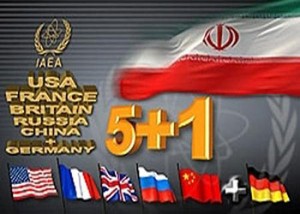 Sunday’s announcement of a January 20 start for the interim nuclear deal between Iran and the 5+1 Powers has been generally welcomed in Tehran.
Sunday’s announcement of a January 20 start for the interim nuclear deal between Iran and the 5+1 Powers has been generally welcomed in Tehran.
Iranian media are already welcoming a visit by the International Atomic Energy Agency to Tehran on Saturday, and they are headlining a statement by the lead 5+1 negotiator, the European Union’s Catherine Ashton, that she will accept an invitation to come to Tehran “in the course of the next weeks”.
Iran’s lead negotiator, Deputy Foreign Minister Abbas Araqchi, said that a meeting between Ashton and Iranian Foreign Minister Mohammad Javad Zarif is likely in February, although no date has been set.
Alaeddin Boroujerdi, the head of Parliament’s National Security Commission, said that the 5+1 Powers hadaccepted Iran’s operation of new IR-2M centrifuges in the Natanz enrichment plants.
Western diplomats told journalists last week that the centrifuges, replacing the 40-year-old IR-1 model, were one of the remaining issues to be resolved before implementation of the interim deal. They said Iran could carry out research and development, but could not install the IR-2Ms.
However, Boroujerdi said, “At last, the Group 5+1 accepted…that Iran’s operating new generation of centrifuges for research does not run counter to the Geneva agreement.”
The Revolutionary Guards, which had initially challenged the Rouhani Government’s nuclear diplomacy this summer, were receptive on Monday.
“This is the first step toward a cease-fire,” Rasoul Sanaeirad, a political assistant to the Guards, said, “It seems the Americans are determined to overcome the atmosphere of conflict.”
There was a sign of opposition from the hard-line outlet Mashregh, which accused Araqchi of hiding details on the agreement to implement November’s deal on uranium enrichment and a start to the lifting of sanctions on Tehran.
“If you want the support from the people, do not withhold information from them,” an editorial declared, claiming that key changes had been made in the agreement in the last two months.
Cultural Events Postponed and Cancelled in Tehran — Days After Rouhani Pledged “Freedom” in Arts
Iranian authorities have inexplicably delayed and cancelled two cultural events in Tehran in the last week.
An exhibition of paintings commemorating the birthday of the beloved female poet, Forough Farrokhzad, was suddenly postponed last Friday. The exhibition in Tehran’s Vista Gallery was to be accompanied by a series of seminars on poetry, cinema, and painting.
According to the Rooz-e-No website, “a state organization” informed the exhibition managers on Friday morning that the exhibition must be shut down, without providing reasons.
The exhibition opened on Sunday, citing “technical difficulties” for the delay.
Meanwhile, the annual gathering held by the popular magazine Chelcheragh was cancelled minutes before its start on Sunday, with hundreds of people outside the Tehran venue.
The magazine’s managing editor, Fereidoon Amouzadeh Khalili, said that necessary permits had been withheld.
Some guests said the reason for the cancellation was an invitation to former Iranian President Mohammad Khatami to attend. Khalili would not confirm the claim.
General Hossein Sajedinia, the Greater Tehran Police Commander, said, “The ceremony was cancelled on orders” from the Tehran Prosecutor General.
The incidents may be part of a rising challenge from MPs and hard-line media, supported by the Supreme Leader’s office, to President Rounani’s promises to open up Iran’s cultural sphere. Rouhani had told Iranian authors, artists, musicians, actors, and directors last Wednesday:
No real art is created in an atmosphere that is not free; in the realm of arts, creativity and creation cannot happen on command….
The government’s responsibility is not to interfere in the arts.
By Ea World View
The Iran Project is not responsible for the content of quoted articles.

 QR code
QR code